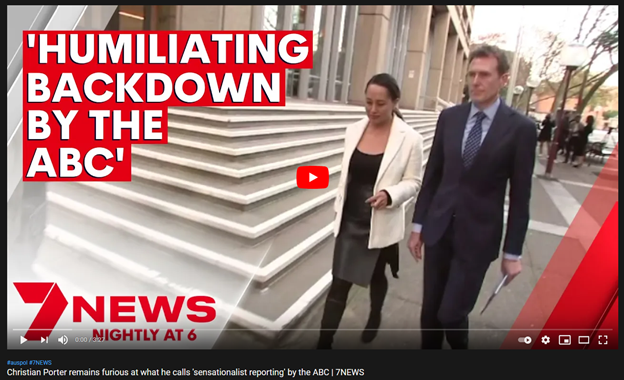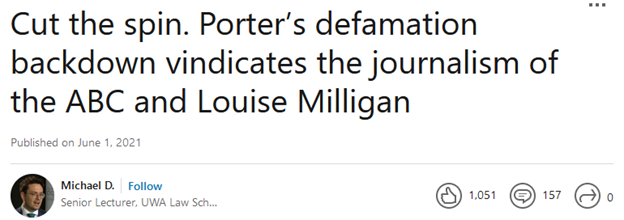Legal experts were in no doubt whatsoever that Christian Porter had given up but News Corp madly spun the line that it was a humiliating backdown by the ABC. Michael Tanner dissects the coverage of what had been billed ‘the defamation trial of the century’.
Twenty-four news articles and/or commentaries; 17 letters to the editor; and a muddled, spittle-covered editorial, the logic of which was confusing.
It decried an age in which there is “less transparency” as “politicians lie without a glimmer of guilt”, and where “getting to the truth in public life has never been more difficult”.
Yet it simultaneously mounted an assault on “the habits and the hubris” of Four Corners‘ journalists Sally Neighbour and Louise Milligan, imputing that they had engaged in “bad, lazy, deceitful journalism”.
The outlet was, of course, The Australian. And the topic was, of course, Christian Porter’s defamation suit against the ABC.




News Corp’s message was clear
The message News Corp was trying to sell is clear: the ABC lost and Porter won the defamation case; and those who shared the story were activists and not to be trusted.
The Australian took as gospel the comments that Porter made in his press conference after dropping the case where he claimed victory, stating it had been a “humiliating backdown” from the ABC and that it “regret[ted]” the article.
Others were quick to join in. 7News ran a segment parroting Porter’s claims; as did Sky News.
7News

Sky News

Now for the balanced coverage
The Australian Financial Review, in stark contrast, had balanced and insightful coverage.
Legal editor Michael Pelly and defamation lawyer Justin Quill both penned op-eds explaining that the aim of bringing a defamation lawsuit was “to prove what was written about you is false, malicious or unjustified – and to be compensated for the reputational damage”, or to seek “compensation, an apology, or to get an online article or publication removed – or perhaps all three”.
Both writers concluded that Porter notched zero for three on all counts.



Similarly Michael Douglas, a defamation lawyer and senior lecturer at the University of Western Australia law school, concluded that:
“Porter can try to spin this however he likes. He was suing in one of the most pro-plaintiff jurisdictions in the world, with the most pro-plaintiff defamation law in the world, and he has given up.”

Both Pelly and Douglas pointed out that it became a public relations battle, and who better to spin a PR battle than the Murdoch press.
Egg must surely be on the face of Gerard Henderson, from The Australian, author of the op-ed titled “ABC’s activist journos hail a victory that never was”. How about “Murdoch’s muppets hail a victory that never was”?
The Sydney Morning Herald, similarly, offered balanced coverage.

PM always the ‘winner’ for some
However, there was still time for David Crowe to relate it back to Prime Minister Scott Morrison, seemingly the “winner” of any event in Australian politics.

Nor did Crowe miss the chance to defend Porter’s return to cabinet, once more bringing out the “what-about-Bill-Shorten argument”, a favourite of the conserative press in recent months.
This is despite some pretty solid differences – while the ex-Labor leader was accused of rape, his case was thoroughly investigated by police over many months and was found to lack substance. Shorten was also questioned by the police. Neither happened with the Porter allegations. Porter remains un-investigated, but according to Crowe, “the cases are not sufficiently different to justify a double standard”.
But luckily, the Porter story arc didn’t get too dreary. The Sydney Morning Herald took the time to fill us in on his newest love – fortuitous timing for a puff piece.

Michael Tanner is completing a Doctor of Medicine/Doctor of Philosophy. His writing explores the intersection of economics, the media and public health. His writing has also been published in The Age.

